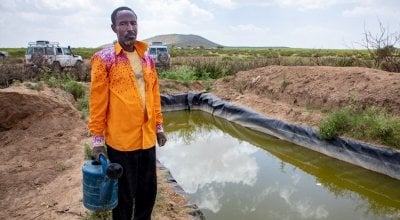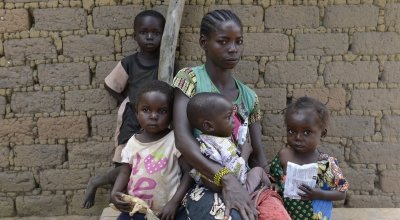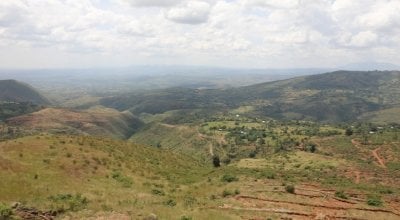
Read our 2024 annual report

Knowledge Hub
Why climate change? Climate change is a driver of humanitarian crises and is affecting millions of people already vulnerable due to existing and ongoing challenges.
Climate change is increasing the occurrence of natural disasters and is a significant factor in many conflicts. It is also becoming a major driver of migration and displacement. In many of the countries where we work, people rely on the food gained from their land to survive. Extreme weather events such as drought and flooding, and associated threats such as locust invasions, can decimate these crops and have a devastating impact on people's ability to feed their families.
Concern’s approach to environmental protection aims to conserve natural resources and, where possible, to repair damage and reverse trends. As well as meeting immediate needs such as food and livelihood support, we also work with farmers to help them adjust to climate change and build resilience for the future.
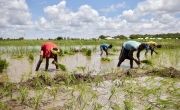



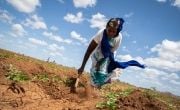
A closer look at our climate programmes
Climate change impacts are likely to play out disproportionately across countries, exacerbated by pre-existing inequalities. Those living in fragile and conflict-affected states are hit hardest because they are more vulnerable to the damaging effects of a hazard and have lower coping capacities and supports.
In addition, those hardest hits by the effects of climate change are often those least responsible for emissions.
Climate Smart Agriculture (CSA)
These are agriculture approaches and methods that sustainably increase the amount of crops that a community can produce under conditions of climatic variability. They provide ways to adapt to changes in the weather in the short term (to storms, intense heat, flooding) and in the long term to adapt to a different climate (more or less rain, increased temperatures year on year). Climate Smart Agriculture also aims to reduce emissions and destructive impacts on the land as a result of farming. CSA aims to assist communities to better cope with changing climate – with a specific focus on hunger and poverty.
CSA is an umbrella term used to describe various agriculture interventions. Countries face different challenges so this looks different across the world. However, it might involve changing and diversifying crops to better adapt to a changing environment and associated risks, harvesting rainwater or keeping soil covered with organic matter to keep moisture in.
A notable example of CSA is Conservation Agriculture (CA), an agriculture intervention based around three principles of minimum tillage, soil surface protection, and crop diversification / association. Combined with good risk focused agronomic practices, CA can help farmers improve the productivity of their crops, cope with a changing climate, improve their ability to withstand extreme weather events (irregular or erratic rains), and lower emissions through reduction in burning and gradual accumulation of soil organic matter.
Concern has an organizational commitment to reaching 600,000 farmers with CSA interventions by 2020 and currently implements agriculture livelihoods activities at varying scales across Africa and Asia. In the case of Africa, this includes the hot, semi-arid Sahel, Horn of Africa, and Rift Valley regions (Niger, Chad, South Sudan, Sudan, Ethiopia, Somalia, Kenya, Malawi), the cool Central African highlands (DRC, Burundi, Rwanda), and the humid tropics of West Africa (Liberia, Sierra Leone). In Asia, despite having fewer countries, the diversity is just as striking; the hot Indus Plains of Pakistan, the monsoonal coastal area of Bangladesh, and the temperate, mountainous regions of DPRK and Afghanistan.
In 2020, we reached 210,000 farmers with CSA livelihood activities - bringing the total number of participants to 780,227 since the programme began in 2016.
Disaster Risk Reduction and Resilience
Nature-based solutions

Other ways to help
Corporate support
Is your company interested in working together for a common cause?
Fundraise for Concern
From mountain trekking to marathon running, cake sales to table quizzes, there are lots of ways you can support our work.
Buy a gift
With an extensive range of alternative gifts, we have something to suit everybody.
Leave a gift in your will
Leave the world a better place with a life-changing legacy.
Volunteer with Concern
The lots of ways to get involved with our work as a volunteer
School fundraising
Without the generous support from schools, we wouldn't be able to do the work that we do.


